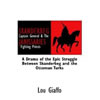Sometimes known as Iskender Bey, Gjergj Skanderbeg is the national hero of Albania and is also sometimes called the Dragon of Albania. He was born in 1405 his father Gjon Kastrioti lord of middle Albania, his mother Vojsava came from what is now Macedonia. Gjon had led resistance against the invading Ottoman Empire but eventually had to submit and pay tribute to Sultan Bayezid I. To help ensure Gjon continued loyality his sons including Gjergj were taken to the Sultans court as hostages. Gjergj converted to Islam and attended military school in Edirne in western Turkey. He had a successful career for the Ottoman Empire and after winning many battles he gained the title Arnavutlu Iskender Bey (or Lord Alexander the Albanian) in reference to the Macedonia leader Alexander the Great, during his victories he fought against Greeks, Serbs and Hungarians.
On 28th November 1443 during a campaign against the Hungarians, Skanderbeg deserted the Ottoman Army along with 300 Albanians under his command; He took control of Kruje castle by using a fake letter from the Sultan which gave him control of the area. Once established he declared to be in revolt against the Ottomans and took the double headed eagle as his flag which had long been used in the Balkans and was to become the basis of the Albanian flag. Skanderbeg worked quickly to gather support by marriage and diplomacy and united many of the Albanian princes in 1444 in the League of Lezhe. Skanderbeg quickly formed a mobile force which used hit and run tactics against the Ottoman forces making use of the mountainous terrain and local support. The league could field about 18,000 troops but only about 4000 were under Skanderbeg’s direct command.
In 1444 Skanderbeg’s forces defeated the much larger army of Ali Pasha, one of the few times the Ottoman Army had been defeated by a European one. This victory was followed up by two more Moker (1445) and Oranik (1447). The Ottomans sent an Army of 150,000 men to lay siege to Kruje Castle in 1450. It soon became apparent that taking the castle by force was not an option and with disease rapidly spreading through the Ottoman camp they were forced to abandon the siege before the onset of winter.
With the fall of Constantinople in 1453 the Ottomans once more set about subduing Albania and Skanderbeg faced them two years later at the Siege of Berat. This time the roles were reversed and it was Skanderbeg who was forced to lift a siege at which point a Turkish relief force helped by a traitorous officer among the Albanians took the besiegers by surprise and inflicted one of the worse defeats Skanderbeg was to suffer.
In 1457 the Ottomans set a 90,000 strong to finally pacify Albania, led by the experienced General Isa beg Evrenoz. After evading the Ottomans for a few months Skanderbeg attacked the Ottoman camp at Ujebardha on 2nd September and defeated them. On 22nd June 1461 the Sultan and Skanderbeg made peace, but Skanderbeg still had more campaigns to fight this time in support of Allies in Naples and against renegades within his own country.
Peace with the Ottoman Empire was to prove short lived and in 1466 Sultan Mehmed II led an army into Albania and once again laid siege to Kruje castle, once again just as it had done against the Sultans father 16 years previously the castle held. The following year the Ottomans tried again to take Kruje castle this time attacking Albania from all sides and reducing Skanderbeg's mobility and cutting his supply lines. The Ottomans were defeated but Skanderbeg died of Malaria on 17th January 1468 and never saw the victory. Without the ability of Skanderbeg Albanian resistance lasted another ten years with Kruje finally falling to the Ottomans in 1478, resistance continued on and off until 1500 but Albania was to remain part of the Ottoman Empire until 1912.
Skanderbeg gained an almost mythical reputation in literature and was often cited by future generals and leaders as the perfect example of defensive warfare against a superior foe, his record was certainly impressive with 25 battles of which he was victorious in 24. It was said that he personally killed over 3,000 Turks in combat and helped give the Papal States time to prepare for the Ottoman attacks, heralded as a Christian hero against the Muslim hordes.
The 21st Waffen SS division which was composed of ethnic Albanians was named after him and saw service on the Eastern Front
 Skanderbeg & The Janissaries (Paperback). An account of Skanderbegs campaigns and battles against the invading Ottoman Empire, one of the few books available in English. Skanderbeg & The Janissaries (Paperback). An account of Skanderbegs campaigns and battles against the invading Ottoman Empire, one of the few books available in English. |

 |